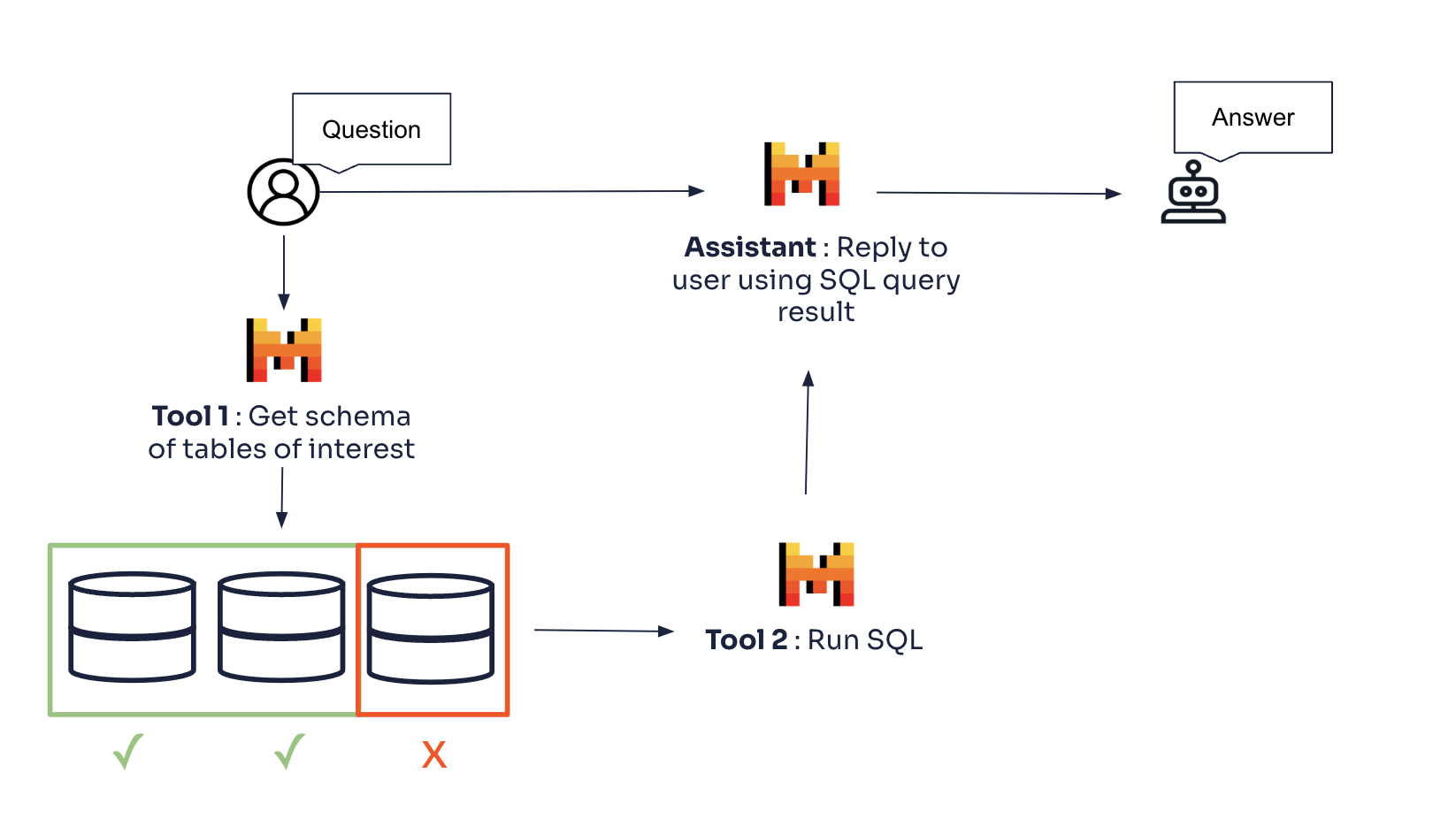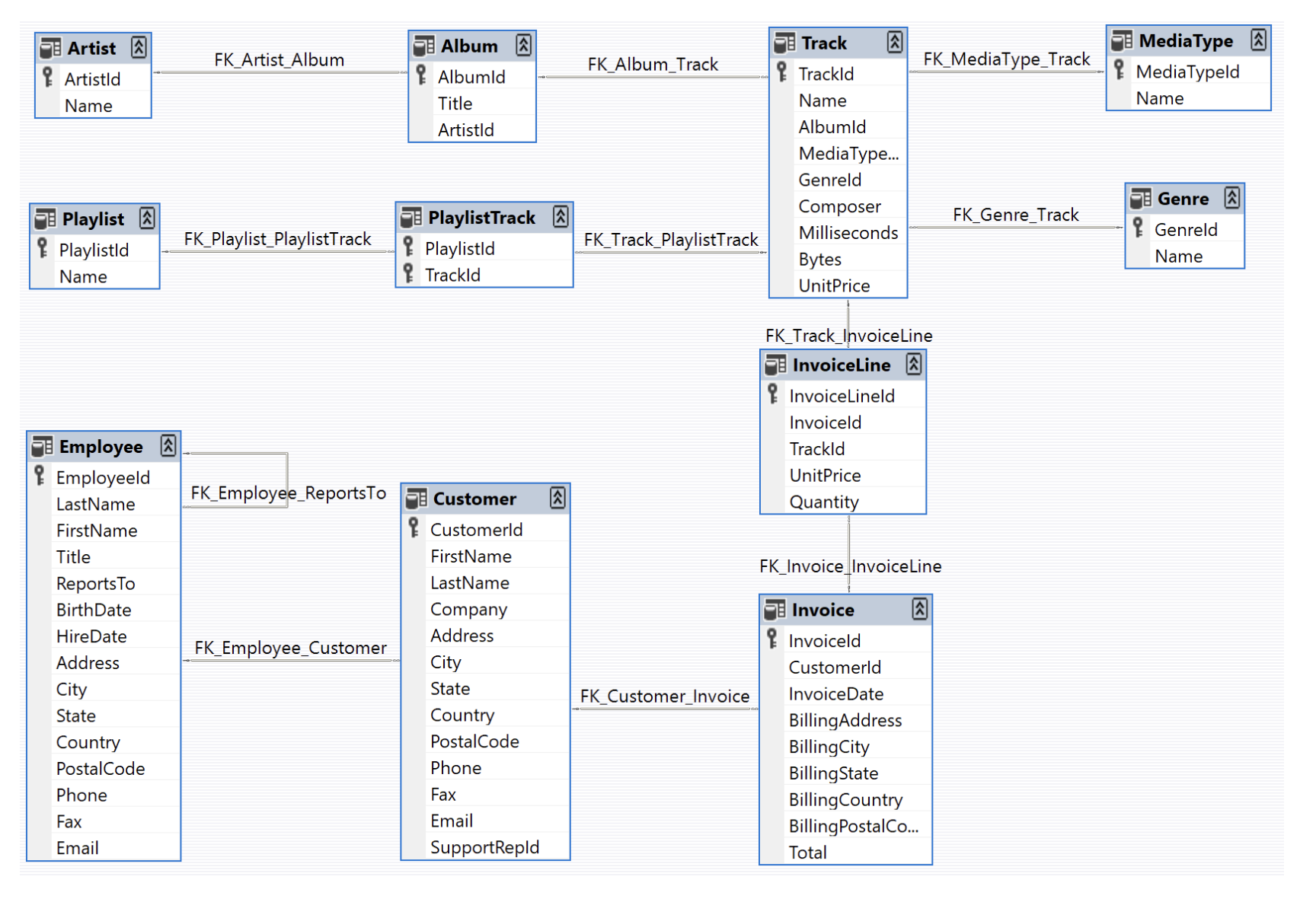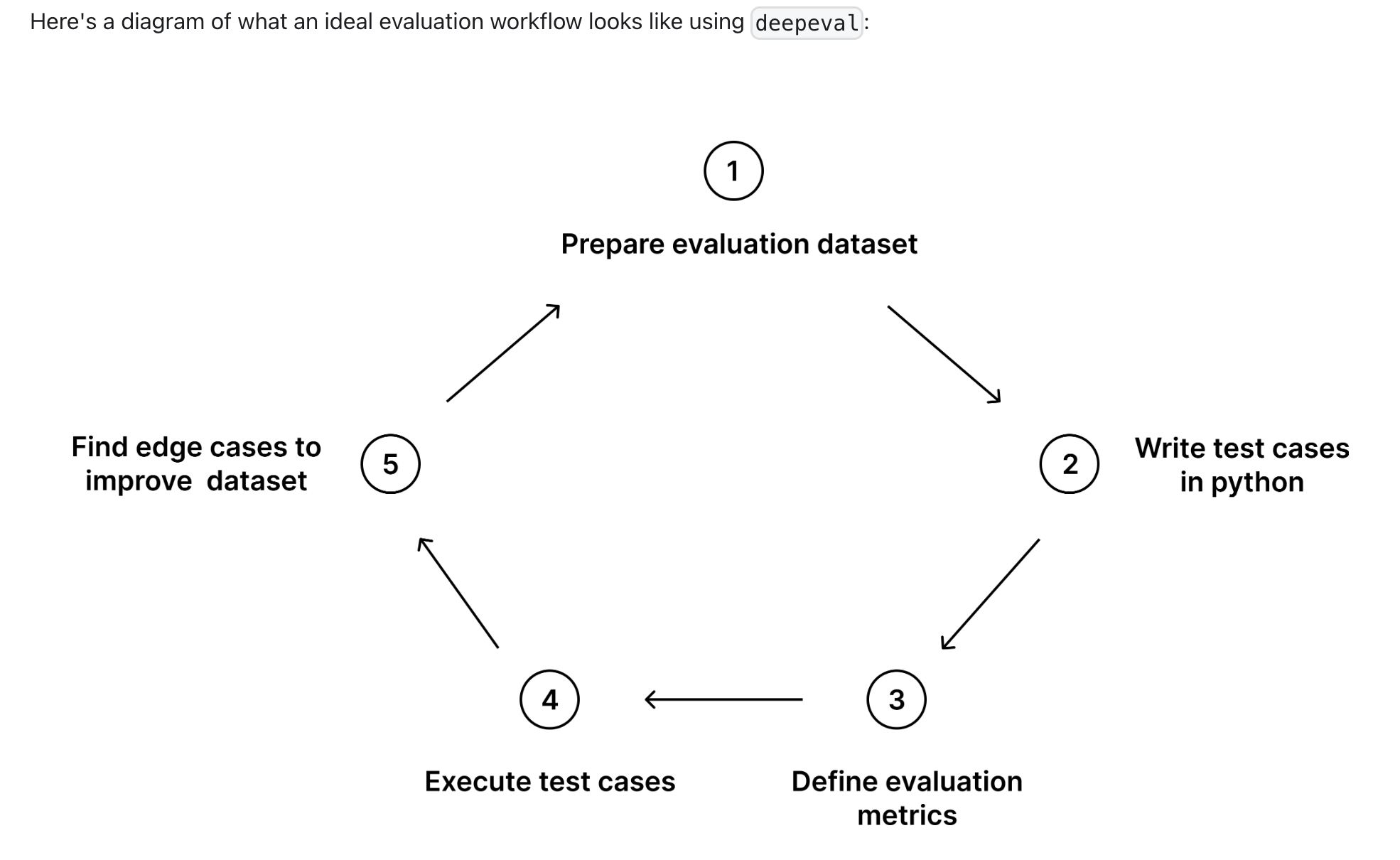
In this cookbook we will show you how to :
- Use the function calling capabilities of Mistral models
- Build a text2SQL architecture that scales more efficiently than a naive approach where all schemas are integrally injected in the system prompt
- Evaluate your system with Mistral models and leveraging the DeepEval framework
Imports
!pip install mistralai langchain deepevalfrom mistralai import Mistral
from getpass import getpass
# To interract with the SQL database
from langchain_community.utilities import SQLDatabase
# To evaluate text2SQL performances
from deepeval.models import DeepEvalBaseLLM
from deepeval.test_case import LLMTestCase, LLMTestCaseParams
from deepeval.dataset import EvaluationDataset
from deepeval.metrics import GEval
import jsonLoad the Chinook database
"Chinook is a sample database available for SQL Server, Oracle, MySQL, etc. It can be created by running a single SQL script. Chinook database is an alternative to the Northwind database, being ideal for demos and testing ORM tools targeting single and multiple database servers."
To run this notebook you will need to download the Chinook datase. You will find more information about this database by clicking on this github link.
To create the Chinook.db in the same directory as this notebook you have several options :
- You can download and build the database via the command line :
curl -s https://raw.githubusercontent.com/lerocha/chinook-database/master/ChinookDatabase/DataSources/Chinook_Sqlite.sql | sqlite3 Chinook.db- Another strategy consists in running the following script
https://raw.githubusercontent.com/lerocha/chinook-database/master/ChinookDatabase/DataSources/Chinook_Sqlite.sql.
Firstly save the script to a folder/directory on your computer. Then create a database called Chinook with sqlite3 Chinook.db. Ultimately run the script with the command .read Chinook_Sqlite.sql

!sudo apt install sqlite3!curl -s https://raw.githubusercontent.com/lerocha/chinook-database/master/ChinookDatabase/DataSources/Chinook_Sqlite.sql | sqlite3 Chinook.db
!sqlite3 Chinook.dbSet up clients
api_key= getpass("Type your API Key")
client = Mistral(api_key=api_key)
uri = "sqlite:///Chinook.db"Interract with the Chinook database
We are defining two functions :
- run_sql_query that runs sql code on Chinook
- get_sql_schema_of_table that returns the schema of a table specified as input
def run_sql_query(sql_code):
"""
Executes the given SQL query against the database and returns the results.
Args:
sql_code (str): The SQL query to be executed.
Returns:
result: The results of the SQL query.
"""
db = SQLDatabase.from_uri("sqlite:///Chinook.db")
return db.run(sql_code)
run_sql_query("SELECT * FROM Artist LIMIT 10;")def get_sql_schema_of_table(table):
"""
Returns the schema of a table.
Args:
table (str): Name of the table to be described
Returns:
result: Column names and types of the table
"""
if table == "Album":
return """ The table Album was created with the following code :
CREATE TABLE [Album]
(
[AlbumId] INTEGER NOT NULL,
[Title] NVARCHAR(160) NOT NULL,
[ArtistId] INTEGER NOT NULL,
CONSTRAINT [PK_Album] PRIMARY KEY ([AlbumId]),
FOREIGN KEY ([ArtistId]) REFERENCES [Artist] ([ArtistId])
ON DELETE NO ACTION ON UPDATE NO ACTION
);
"""
if table == "Artist":
return """ The table Artist was created with the following code :
CREATE TABLE [Artist]
(
[ArtistId] INTEGER NOT NULL,
[Name] NVARCHAR(120),
CONSTRAINT [PK_Artist] PRIMARY KEY ([ArtistId])
);
"""
if table == "Customer":
return """ The table Customer was created with the following code :
CREATE TABLE [Customer]
(
[CustomerId] INTEGER NOT NULL,
[FirstName] NVARCHAR(40) NOT NULL,
[LastName] NVARCHAR(20) NOT NULL,
[Company] NVARCHAR(80),
[Address] NVARCHAR(70),
[City] NVARCHAR(40),
[State] NVARCHAR(40),
[Country] NVARCHAR(40),
[PostalCode] NVARCHAR(10),
[Phone] NVARCHAR(24),
[Fax] NVARCHAR(24),
[Email] NVARCHAR(60) NOT NULL,
[SupportRepId] INTEGER,
CONSTRAINT [PK_Customer] PRIMARY KEY ([CustomerId]),
FOREIGN KEY ([SupportRepId]) REFERENCES [Employee] ([EmployeeId])
ON DELETE NO ACTION ON UPDATE NO ACTION
);
"""
if table == "Employee":
return """ The table Employee was created with the following code :
CREATE TABLE [Employee]
(
[EmployeeId] INTEGER NOT NULL,
[LastName] NVARCHAR(20) NOT NULL,
[FirstName] NVARCHAR(20) NOT NULL,
[Title] NVARCHAR(30),
[ReportsTo] INTEGER,
[BirthDate] DATETIME,
[HireDate] DATETIME,
[Address] NVARCHAR(70),
[City] NVARCHAR(40),
[State] NVARCHAR(40),
[Country] NVARCHAR(40),
[PostalCode] NVARCHAR(10),
[Phone] NVARCHAR(24),
[Fax] NVARCHAR(24),
[Email] NVARCHAR(60),
CONSTRAINT [PK_Employee] PRIMARY KEY ([EmployeeId]),
FOREIGN KEY ([ReportsTo]) REFERENCES [Employee] ([EmployeeId])
ON DELETE NO ACTION ON UPDATE NO ACTION
);
"""
if table == "Genre":
return """ The table Genre was created with the following code :
CREATE TABLE [Genre]
(
[GenreId] INTEGER NOT NULL,
[Name] NVARCHAR(120),
CONSTRAINT [PK_Genre] PRIMARY KEY ([GenreId])
);
"""
if table == "Invoice":
return """ The table Invoice was created with the following code :
CREATE TABLE [Invoice]
(
[InvoiceId] INTEGER NOT NULL,
[CustomerId] INTEGER NOT NULL,
[InvoiceDate] DATETIME NOT NULL,
[BillingAddress] NVARCHAR(70),
[BillingCity] NVARCHAR(40),
[BillingState] NVARCHAR(40),
[BillingCountry] NVARCHAR(40),
[BillingPostalCode] NVARCHAR(10),
[Total] NUMERIC(10,2) NOT NULL,
CONSTRAINT [PK_Invoice] PRIMARY KEY ([InvoiceId]),
FOREIGN KEY ([CustomerId]) REFERENCES [Customer] ([CustomerId])
ON DELETE NO ACTION ON UPDATE NO ACTION
);
"""
if table == "InvoiceLine":
return """ The table InvoiceLine was created with the following code :
CREATE TABLE [InvoiceLine]
(
[InvoiceLineId] INTEGER NOT NULL,
[InvoiceId] INTEGER NOT NULL,
[TrackId] INTEGER NOT NULL,
[UnitPrice] NUMERIC(10,2) NOT NULL,
[Quantity] INTEGER NOT NULL,
CONSTRAINT [PK_InvoiceLine] PRIMARY KEY ([InvoiceLineId]),
FOREIGN KEY ([InvoiceId]) REFERENCES [Invoice] ([InvoiceId])
ON DELETE NO ACTION ON UPDATE NO ACTION,
FOREIGN KEY ([TrackId]) REFERENCES [Track] ([TrackId])
ON DELETE NO ACTION ON UPDATE NO ACTION
);
"""
if table == "MediaType":
return """ The table MediaType was created with the following code :
CREATE TABLE [MediaType]
(
[MediaTypeId] INTEGER NOT NULL,
[Name] NVARCHAR(120),
CONSTRAINT [PK_MediaType] PRIMARY KEY ([MediaTypeId])
);
"""
if table == "Playlist":
return """ The table Playlist was created with the following code :
CREATE TABLE [Playlist]
(
[PlaylistId] INTEGER NOT NULL,
[Name] NVARCHAR(120),
CONSTRAINT [PK_Playlist] PRIMARY KEY ([PlaylistId])
);
"""
if table == "PlaylistTrack":
return """ The table PlaylistTrack was created with the following code :
CREATE TABLE [PlaylistTrack]
(
[PlaylistId] INTEGER NOT NULL,
[TrackId] INTEGER NOT NULL,
CONSTRAINT [PK_PlaylistTrack] PRIMARY KEY ([PlaylistId], [TrackId]),
FOREIGN KEY ([PlaylistId]) REFERENCES [Playlist] ([PlaylistId])
ON DELETE NO ACTION ON UPDATE NO ACTION,
FOREIGN KEY ([TrackId]) REFERENCES [Track] ([TrackId])
ON DELETE NO ACTION ON UPDATE NO ACTION
);
"""
if table == "Track":
return """ The table Track was created with the following code :
CREATE TABLE [Track]
(
[TrackId] INTEGER NOT NULL,
[Name] NVARCHAR(200) NOT NULL,
[AlbumId] INTEGER,
[MediaTypeId] INTEGER NOT NULL,
[GenreId] INTEGER,
[Composer] NVARCHAR(220),
[Milliseconds] INTEGER NOT NULL,
[Bytes] INTEGER,
[UnitPrice] NUMERIC(10,2) NOT NULL,
CONSTRAINT [PK_Track] PRIMARY KEY ([TrackId]),
FOREIGN KEY ([AlbumId]) REFERENCES [Album] ([AlbumId])
ON DELETE NO ACTION ON UPDATE NO ACTION,
FOREIGN KEY ([GenreId]) REFERENCES [Genre] ([GenreId])
ON DELETE NO ACTION ON UPDATE NO ACTION,
FOREIGN KEY ([MediaTypeId]) REFERENCES [MediaType] ([MediaTypeId])
ON DELETE NO ACTION ON UPDATE NO ACTION
);
"""
return f"The table {table} does not exist in the Chinook database"Build agent
def get_response(question, verbose=True):
"""
Answer question about the Chinook database.
Args:
question (str): The question asked by the user.
verbose (bool): If True, prints intermediate steps and results.
Returns:
str: The response to the user's question.
"""
# Define the tools available for the AI assistant
tools = [
{
"type": "function",
"function": {
"name": "get_sql_schema_of_table",
"description": "Get the schema of a table in the Chinook database",
"parameters": {
"type": "object",
"properties": {
"table": {
"type": "string",
"enum": ["Album", "Artist", "Customer", "Employee", "Genre", "Invoice", "InvoiceLine", "MediaType", "Playlist", "PlaylistTrack", "Track"],
"description": "The question asked by the user",
},
},
"required": ["table"],
},
},
},
{
"type": "function",
"function": {
"name": "run_sql_query",
"description": "Run an SQL query on the Chinook database",
"parameters": {
"type": "object",
"properties": {
"sql_code": {
"type": "string",
"description": "SQL code to be run",
},
},
"required": ["sql_code"],
},
},
}
]
# System prompt for the AI assistant
system_prompt = """
You are an AI assistant.
Your job is to reply to questions related to the Chinook database.
The Chinook data model represents a digital media store, including tables for artists, albums, media tracks, invoices, and customers.
To answer user questions, you have two tools at your disposal.
Firstly, a function called "get_sql_schema_of_table" which has a single parameter named "table" whose value is an element
of the following list: ["Album", "Artist", "Customer", "Employee", "Genre", "Invoice", "InvoiceLine", "MediaType", "Playlist", "PlaylistTrack", "Track"].
Secondly, a function called "run_sql_query" which has a single parameter named "sql_code".
It will run SQL code on the Chinook database. The SQL dialect is SQLite.
For a given question, your job is to:
1. Get the schemas of the tables that might help you answer the question using the "get_sql_schema_of_table" function.
2. Run a SQLite query on the relevant tables using the "run_sql_query" function.
3. Answer the user based on the result of the SQL query.
You will always remain factual, you will not hallucinate, and you will say that you don't know if you don't know.
You will politely ask the user to shoot another question if the question is not related to the Chinook database.
"""
# Initialize chat history with system prompt and user question
chat_history = [
{
"role": "system",
"content": system_prompt
},
{
"role": "user",
"content": question
}
]
if verbose:
print(f"User: {question}\n")
used_run_sql = False
used_get_sql_schema_of_table = False
# Function to determine tool choice based on usage
def tool_choice(used_run_sql, used_get_sql_schema_of_table):
# If the question is out of topic the agent is not expected to run a tool call
if not used_get_sql_schema_of_table:
return "auto"
# The agent is expected to run "used_run_sql" after getting the specifications of the tables of interest
if used_get_sql_schema_of_table and not used_run_sql:
return "any"
# The agent is not expected to run a tool call after querying the SQL table
if used_run_sql and used_get_sql_schema_of_table:
return "none"
return "auto"
iteration = 0
max_iteration = 10
# Main loop to process the question
while iteration < max_iteration:
inference = client.chat.complete(
model="mistral-large-latest",
temperature=0.3,
messages=chat_history,
tools=tools,
tool_choice=tool_choice(used_run_sql, used_get_sql_schema_of_table)
)
chat_history.append(inference.choices[0].message)
tool_calls = inference.choices[0].message.tool_calls
if not tool_calls:
if verbose:
print(f"Assistant: {inference.choices[0].message.content}\n")
return inference.choices[0].message.content
for tool_call in tool_calls:
function_name = tool_call.function.name
function_params = json.loads(tool_call.function.arguments)
if function_name == "get_sql_schema_of_table":
function_result = get_sql_schema_of_table(function_params['table'])
if verbose:
print(f"Tool: Getting SQL schema of table {function_params['table']}\n")
used_get_sql_schema_of_table = True
if function_name == "run_sql_query":
function_result = run_sql_query(function_params['sql_code'])
if verbose:
print(f"Tool: Running code {function_params['sql_code']}\n")
used_run_sql = True
chat_history.append({"role": "tool", "name": function_name, "content": function_result, "tool_call_id": tool_call.id})
iteration += 1
returnTest the agent
Let's test the agent and ask a few random questions of increasing complexity
# Lets start by checking how the model reacts with out of topic questions!
response = get_response('What is the oldest player in the NBA?')response = get_response('What are the genre in the store?')response = get_response('What are the albums of the rock band U2?')response = get_response('What is the shortest song that the rock band U2 ever composed?')response = get_response('Which track from U2 is the most sold?')response = get_response('Which consumer bought the biggest amound of U2 songs?')response = get_response('List all artist that have a color in their name')response = get_response('Who are our top Customers according to Invoices?')Evaluating
Let's try to evaluate the agent in a more formal way.
We will build a test set based on the questions from this Medium article Chinook question/answers
We will evaluate answers via LLM as a judge through the framework DeepEval from which the image here below is taken.

class CustomMistralLarge(DeepEvalBaseLLM):
def __init__(self, api_key):
self.client = Mistral(api_key=api_key)
self.model_name = "mistral-large-latest"
def get_model_name(self):
return "Mistral-large-latest"
def load_model(self):
# Since we are using the Mistral API, we don't need to load a model object.
return self.client
def generate(self, prompt: str) -> str:
chat_response = self.client.chat.complete(
model=self.model_name,
messages=[
{
"role": "user",
"content": prompt,
},
]
)
return chat_response.choices[0].message.content
async def a_generate(self, prompt: str) -> str:
# Reusing the synchronous generate method for simplicity.
return self.generate(prompt)# Specify questions
questions = [
"Which Employee has the Highest Total Number of Customers?",
"Who are our top Customers according to Invoices?",
"How many Rock music listeners are there?",
"What artists have written most rock music songs?",
"Which artist has earned the most according to the Invoice Lines? How much is it?",
"How many tracks have a song length greater than the average song length?",
"What is the most popular genre for Australia?"
]
# Specify associated answers
golden_answers = [
"Peacock Jane has the most customers (she has 21 customers)",
"Helena Holy, Richard Cunningham, Luis Rojas, Ladislav Kovacs, and Hugh O’Reilly are the top five customers who have spent the highest amount of money according to the invoice",
"We found out that all 59 customers in the database have listened to Rock Music.",
"Led Zeppelin tops the list of Artists who have written the most Rock Music with 114 songs followed Closely by U2 with 112 music.",
"The Artist who has earned the most according to the invoice lines is Iron Maiden with a total of $138.6.",
"Out of 3503 songs in the database, we found out that 494 of these songs have length more than the average music length of 393,599.21 milliseconds.",
"Rock is the most popular song for Australia"
]
# Build evaluation dataset
test_cases = [
LLMTestCase(
input=question,
actual_output=get_response(question, verbose=False),
expected_output=golden
) for question, golden in zip(questions, golden_answers)
]
dataset = EvaluationDataset(test_cases=test_cases)
# Specify evaluation metric
correctness_metric = GEval(
name="Correctness",
criteria="Determine whether the actual output is factually correct based on the expected output.",
# NOTE: you can only provide either criteria or evaluation_steps, and not both
evaluation_steps=[
"Check whether the facts in 'actual output' contradicts any facts in 'expected output",
"You should also heavily penalize situations where the actual output does not answers the question",
],
evaluation_params=[LLMTestCaseParams.INPUT, LLMTestCaseParams.ACTUAL_OUTPUT, LLMTestCaseParams.EXPECTED_OUTPUT],
model=CustomMistralLarge(api_key)
)
# Evaluate agent
dataset.evaluate([correctness_metric])